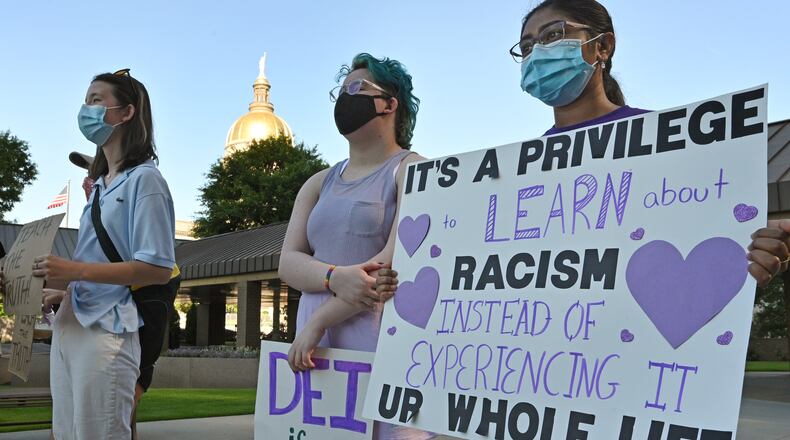The General Assembly is now full of Southern white men bemoaning the threat to their children from class discussions of “divisive concepts” such as systematic racism.
While agreeing the existence of racism ought to be taught in a historical context, they maintain there’s no need for it being mentioned elsewhere, often citing Martin Luther King Jr.’s vision of a colorblind society.
The Republican majority wants to banish any examination of present-day racism, introducing multiple bills that derive from a 2020 Donald Trump executive order, since repealed by the Biden administration.
At a hearing last week on House Bill 1084, sponsor Rep. Will Wade, R-Dawsonville, said, “There are those that have a partisan agenda and they are dividing students along political lines. They are promoting the idea that they may oppress other students based on their race, that students’ character should be judged not by their actions or their words, but merely by their race.”
In misappropriating King’s words, GOP legislators conveniently forget, as Bernice King has stressed, her father “was not a drum major for a colorblind society, but for justice.”
No white lawmakers ever repeat King’s statement that, “Whites, it must frankly be said, are not putting in a similar mass effort to reeducate themselves out of their racial ignorance. It is an aspect of their sense of superiority that the white people of America believe they have so little to learn.”
Nor do these Republican lawmakers who lament that their kids are hearing about systematic racism acknowledge that Black parents live in fear of their children becoming victims of it.
We don’t have to travel back in history to see the deadly consequences of the white privilege and the racism embedded in our Georgia legal system. The three white men convicted in November of chasing and gunning down Ahmaud Arbery went on freely with their lives for more than two months after the 25-year-old’s death until a video exposed the lie that Arbery was the aggressor and was killed in self-defense. The arrests came only after worldwide outrage at the graphic and shocking video.
Yet, white lawmakers insist the most urgent danger is that their children may come to believe they live in a racist state or nation. For decades, these same lawmakers have ignored Black parents protesting disparate school discipline rates. A new Southern Education Foundation study found that Black students faced school suspensions, referrals to law enforcement, and school-related arrests at disproportionately higher rates. Of those referred to law enforcement in Georgia schools, 56% were Black, despite Black students representing only 37% of the total student population.
Lawmakers also long shrugged off Black parents who said their children should see themselves in literature and history books, as do white kids. A math lesson in a Gwinnett school a decade ago referenced once enslaved abolitionist Frederick Douglass by asking, in a perverse way to teach multiplication, “If Frederick got two beatings per day, how many beatings did he get in one week?” There was no groundswell in the General Assembly for laws to protect Black children from such insensitivity as there has been in response to even the possibility white kids might learn about the evils of white supremacy and take it personally.
In its analysis of Georgia’s standards around teaching slavery, the Southern Poverty Law Center found, “The standards as a whole provide exceedingly weak coverage of slavery, setting no expectations that teachers will examine the pervasiveness of the institution and its lasting impact.”
Under the current GOP bills, any teacher who discusses slavery’s pervasiveness and its impact could easily end up in front of the state board of education because of a parent complaint.
College students speaking at the hearings told legislators that banning so-called divisive concepts assures a continued whitewashing of state history, which already favors nostalgia over facts. Several students recalled little to no discussion in their K-12 classes of the 1906 Atlanta Race Massacre where lawless white mobs killed 25 Black people or Forsyth County’s 1912 “racial cleansing” where whites terrorized and drove out 1,100 Black residents.
Georgia Tech student Alex Ames said these bills disregard the real problems in Georgia schools, including students of color seldom seeing teachers who look like them, immigrant children being told their families don’t belong and schools with only one counselor for 700 kids.
“These are the actual emergencies facing all kids in Georgia, especially Black, immigrant and impoverished students,” she said. “Not myths manufactured to excuse politicians meddling in the classroom.”
About the Author
The Latest
Featured


